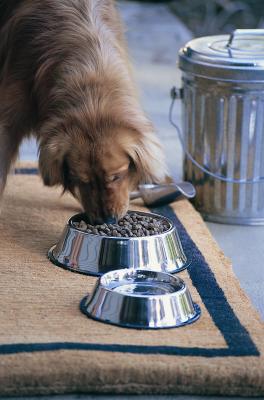Several months ago I adopted Hank, a five-year old mutt, from the local Humane Society. I had every hope that he would be a companion and playmate for Banjo, my Australian Shepherd. Unfortunately, things didn't turn out the way I expected. All in all, it was a very bad day for me, for the local veterinarian, for the people at the animal shelter who had come to love quiet, mild-mannered Hank, and, of course, for Hank himself.
The first inkling I had that something was very wrong with Hank came while walking him around the exercise yard at the shelter. Hank stopped to piddle so often that I remarked on it, but the shelter volunteer said it was common with animals that are locked in their pens for so long every day. A housebroken dog, she said, will "hold it" until he gets outside, and then the floodgates open. That sounded reasonable to me, so I filled out the adoption paperwork, handed over the fees, and took Hank out to my car, where I saw the second indication of severe illness. Hank actually fell into my small car. This lack of coordination seemed like a small problem, but it did put me on alert.
He and Banjo seemed to get on just fine when I introduced them at home, but Hank still wasn't acting right. The floodgates were still open, and he couldn't stay away from the water dish. His fur was falling out in great gobs, and something in Hank's eyes told me he just didn't feel good. I called the local vet and asked for an emergency appointment.
To make a long story short, Hank had to be put down that afternoon after tests showed his kidneys were shutting down. The vet said it was most likely that Hank had been poisoned, probably with antifreeze, a sweet-tasting liquid that dogs find irresistible, but which can cause mental confusion, vomiting, kidney failure, and death. Hank would have lapped up the antifreeze before he was brought to the shelter, where he spent several weeks waiting for someone to take him home. If the shelter volunteers had been more observant, could they have saved Hank? It's possible, but we'll really never know.
Unfortunately, antifreeze is not the only common household chemical that can cause serious illness in dogs. Since dogs are curious creatures, and some of these poisons taste good to both dogs and children, special caution should be taken to keep the following substances away from your pets. If you suspect that your dog has ingested any of these products, or if it shows any of the following signs of illness, he must be taken immediately to the nearest veterinary clinic.
Antidepressant drugs, which can cause irregular heartbeat, vomiting hyperactivity, tremors and seizure.
Pesticides, such as flea and tick collars, sprays and powders; rat poisons; strychnine; and zinc phosphate. The symptoms of poisoning will vary, depending on the particular pesticide that was ingested. Symptoms can include vomiting, diarrhea, lack of balance or coordination, nosebleeds, internal bleeding through the gut or urinary track, difficulty breathing, listlessness, nervousness, seizures, and death. If your pet gets into one of these poisons, try to take the container with you to the vet's office, so he or she can give the appropriate antidote and emergency treatment as quickly as possible.
Antifreeze, as noted earlier. Immediate veterinary treatment may be able to save your pet, from kidney failure if it is rushed to the animal clinic in time.
Ammonia, disinfectants, and fabric softener can cause vomiting, diarrhea and seizures. Call your pet's veterinarian immediately - the clinic may suggest that you give the dog milk or water to dilute the poison before rushing it to the clinic.
Household bleach can cause excessive salivation (or slobbering), and vomiting. Again, call your vet immediately to see if you should try to dilute the poisons by giving your dog emergency care at home before rushing it to the clinic. Bleach can cause ulcerations to the stomach lining and gastrointestinal tract.
Lead from old paint, batteries, lead glazing on pottery, and bird shot may cause vomiting, constipation or diarrhea, muscle spasms, blindness, and personality changes. The dog's veterinarian will need to run some tests to see if lead is the cause of the illness, and may need to perform surgery if the item is still in the dog's stomach.
Petroleum products, like gasoline or other fuels, solvents, and paints, can poison a dog either through eating it, breathing it, (which can burn the lining of the lungs), or getting it on the skin. If one of these products gets on your dog's fur, immediately wash it off with water and detergent, and then get him to the vet. If the product has been ingested or if the dog has been breathing the fumes, medical care will be required to reduce the damage.
Less potent but still dangerous substances that can cause symptoms of poisoning in dogs are chocolate, caffeine, onions and garlic.

 How to Tell if a Dog is Dehydrated
How to Tell if a Dog is Dehydrated
How
How to Tell if a Dog is Dehydrated
How to Tell if a Dog is Dehydrated
How
 How to Hydrate a Dog at Home
How to Hydrate a Dog at Home
How to Hy
How to Hydrate a Dog at Home
How to Hydrate a Dog at Home
How to Hy
 How to Prevent a Dog From Excessively Licking Sores
How to Prevent a Dog From Excessively Licking
How to Prevent a Dog From Excessively Licking Sores
How to Prevent a Dog From Excessively Licking
 Does Olive Oil Make Your Dog's Hair Shiny?
Does Olive Oil Make Your Dog's Hair Shiny
Does Olive Oil Make Your Dog's Hair Shiny?
Does Olive Oil Make Your Dog's Hair Shiny
 Hazards Lurking in Your Dogs Medicine Cabinet
Hazards Lurking in Your Dogs Medicine Cabinet
Hazards Lurking in Your Dogs Medicine Cabinet
Hazards Lurking in Your Dogs Medicine Cabinet